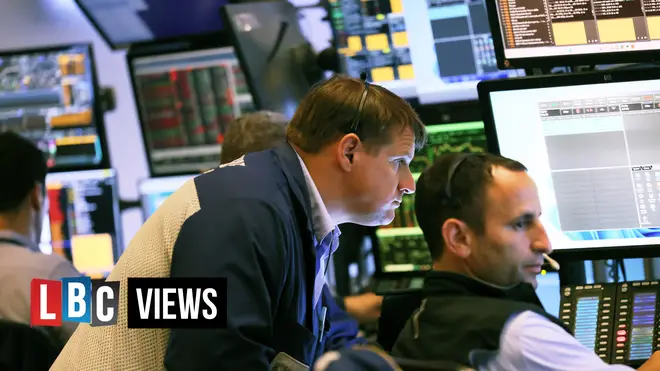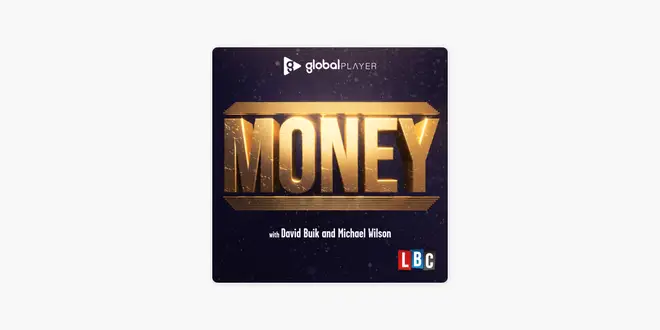
James O'Brien 10am - 1pm
21 August 2023, 06:39 | Updated: 22 August 2023, 14:52

At the start of the year the cumuli nimbus clouds hanging over global stock markets looked both ominous and threatening. There seemed to be no end in sight to the Russian invasion of Ukraine. Gargantuan energy costs had fuelled inflation in 2022 to levels not seen for nearly 40 years, especially in the UK.
The UK’S inflation in October 2022 stood at an eyewatering of 11.1%. The EU’s level was a smidgen less at 10.6%. US inflation only reached 7.2%, courtesy of energy sufficiency. Investors have also had to take into the consideration the fact that the Chinese economy has not come out of the pandemic in good shape. The Peoples’ Bank of China have had to cut rates officially from 2.65% to 2.5% to help ease the borrowing costs of a faltering property market, which at the same time puts the Yuan under duress. Last week the Evergrande Group filed for Chapter 15 bankruptcy protection in a U.S. bankruptcy court. Also, it is thought that unaudited employment data suggests that 21% of students, having finished their academic studies remain unemployed. These are not encouraging statistics.
Today inflation, in general terms, has eased, with the cost of Brent Crude falling from $118 a barrel in June 2022 to $84 last Friday, but continues to remain stubborn – US 3.2%, UK 6.8%, and EU 5.5%. However, Central Banks are still prepared to hike interest rates further, if inflation refuses to retreat, despite the FED having intervened eleven times and the Bank of England fourteen times in the recent cycle. These threats above all else have been the main driving force in maintaining a high level of volatility, that has created intense uncertainty, which has prevailed in recent months.
Unsurprisingly Russia remains under the economic cosh. The Rouble has dropped close to 25% against the Dollar since January and interest rates have been jacked up by 3.5% to 12%. One of Russia’s responses may be to increase the price of their oil.
Action of that ilk would not be constructive to the global economic plight.
Consequently, for many sectors, increased profits have been at parsimonious levels. The cost of servicing debt has stifled growth with the consumer being left with less disposable income to spend on retail therapy. It is easy to forget that 60% of growth tends to emanate from retail activity. During the pandemic of 2020/21, it is thought that the US public squirrelled away $2.1 trillion and the UK about £170 billion. Hence retail spending and money for holidays and entertainment has remained relatively robust for the more affluent members of society. It is thought that these surpluses may be running dry, with inflation and the cost of mortgages having all but drained their resources. There is little doubt that the more affluent have become even more so and those without are really suffering.
Here is a table of most of the global indices’ performance since the start of the year - FTSE -3.86%, DAX +10.70%, CAC40 +8.64%, DJIA +4.12%, S&P500 +14.27%, NASDAQ +27.96%, NIKKEI +22.30%, HANG SENG -10.89%, SHANGHAI +0.50%, FTSE 250 -5.42%.

After a cautious start to the year, it became clear that US tech was going to be the sector that investors maintained their love affair with. Gains made by Nvidia (+202%), Alphabet (+43%) , Amazon (+55%), Apple (+39%), Tesla (+99%), Microsoft (+32%), Meta (+127%), Uber (+76%) and Netflix (+37%) were beyond most peoples’ wildest dreams. In the past month, despite the huge gains these companies have surrendered between 5% and 15%.
August has proved an investors’ nightmare. The news flow has been dire, as illustrated by my observations above. Growth in Europe is almost at recessionary levels. The UK is just about bobbing around just above the Plimsoll line with the US hoping to deliver GDP of 1.5%. These look rather stagnant efforts, offering scant hope of much in the way of an increase in 2024. These indices have surrendered value in August - FTSE 100 -5.7%, DAX -5.3%, S&P 500 -4.8%, NASDAQ -7.3%, Hang Seng -10.6%, Nikkei 225 +0.8%, Shanghai Composite -4.8%.
The performance of the FTSE 100 has been particularly disappointing. This index, however, is not a barometer of UK economic activity. 60% of its earnings are Dollar and Euro denominated. The mining sector, courtesy of a drop in Chinese demand has been ripped asunder in terms of share price. The likes of Anglo-American, Rio Tinto and Glencore have surrendered value between 20% and 40% this year. Banks, apart from HSBC and Standard Chartered – not known especially for UK earnings, have also under-performed. Vodafone, a large constituent stock is down 17% year to date and the usual energy bellwethers – Shell and BP have remained in neutral, though Centrica has risen like the phoenix from the ashes - up 55%! However, it would be totally churlish of me not to mention the recovery success of Rolls Royce - +103.41% this year – the return of air travel with a vengeance and outstanding management.

Let’s shout about M&S, which has seen a massive turnaround this year – shares up 74%. Primark’s owner AB Foods has also delivered. Inexpensive attractive clothes still have a market – up 19%, with NEXT going from strength to strength - +15%. Luxury goods started to do well in places with France’s LVMH up about 28% three months ago, but it’s share price has drifted back to being only up 11% year to date. From Europe has seen strong performers in H&M (+41%) and Inditex (+32%). It just shows if attractive fashions are put on the shelves at the right price they sell! The US has also had its retail stars in Abercrombie & Fitch +83.05%, Nordstrom +17.93% and Urban Outfitters +47.32% year to date. However, could the retail party be about to flatten off, with the cost of borrowing ripping holes in consumers’ budgets?
August has been all about programme trading and algorithms on very thin volumes plus the added ingredient of ‘short-selling’ titans such a Michael Burry, who has allegedly negative positions on the S&P500 and the NASDAQ to the tune of $1.6 billion. He has a decent track record especially on property. We shall see if he is right. The holiday season is over in September. Will stock markets hold their nerve or will the stench of a threatened recession in some parts of the world, see equity markets continue to falter? With the added additions of uncomfortable Chinese economic vibes and sovereign debt at all-time ‘highs’ – US $31 trillion (117% of GDP) and UK £2.5 trillion (99% of GDP) – no one can really be surprised. But as the old adage goes – ‘We live in hope’ that inflation will continue to fall and that Central Banks stop ramping up interest rates. They are blunt instruments. We need stimulation!